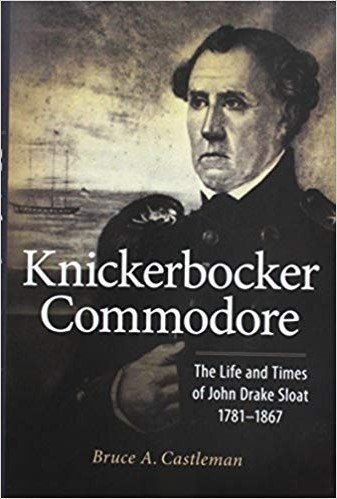Knickerbocker Commodore: The Life and Times of John Drake Sloat, 1781-1867
Bruce A. Castleman
 Sloat’s work, which focuses on an often overlooked but important military figure, is superb. Commodore John Drake Sloat was an important naval officer from the time of the United States Navy’s inception during John Adams’s administration until the Mexican-American War, or for nearly one-half a century. During that time, his rise in the ranks involved him in military actions, political intrigue and important diplomatic maneuverings.
Sloat’s work, which focuses on an often overlooked but important military figure, is superb. Commodore John Drake Sloat was an important naval officer from the time of the United States Navy’s inception during John Adams’s administration until the Mexican-American War, or for nearly one-half a century. During that time, his rise in the ranks involved him in military actions, political intrigue and important diplomatic maneuverings.
Castleman criticizes Sloat’s lone other biographer, noting that the biography is quite dated and hagiographic. Thus, Castleman seeks to fill a gap in the literature by presenting a balanced account of Sloat. This he does; although Castleman’s book is on the whole laudatory of Sloat, he does not shy away from including primary source evidence that Sloat acted dishonestly when it suited his purposes. For example, Sloat falsely claimed, in a report to the State Department, to have hosted Simon Bolivar on a trip to South America to improve his hopes of being reimbursed for actually having feted lesser-known figures. There are other instances in the book where Castleman criticizes Sloat's military tactics.
Castleman’s work is enhanced by his own combination of naval experience (he was a naval commander with twenty-four years’ service) and academic training. He explains cogently and clearly concepts that might otherwise escape a reader who lacks military training or experience. His background makes him an ideal author for Sloat’s biography, for the work is really a history of the United States Navy in its first several decades. Castleman takes seriously his mandate to tell of Sloat’s “life and times.” Thus the reader learns much about the history and methods of ship-building, the politics involved in advancing in the Navy’s officer ranks, of a Naval officer’s career path when he was not aboard ship, and the effects of political decisions like the 1808 Embargo to John Fremont’s exploration of California amongst others.
Sloat's career had political aspects as well. He served, for example, as the Commandant of the Portsmouth Naval Yard in between assignments at sea and developed his own administrative and political skills in that capacity. In the course of tracing Sloat’s career, the author introduces the reader to several other leading figures of the day, naval and otherwise, including Fremont, Matthew Perry, Stephen Decatur, and Simon Bolivar.
Castleman’s use and evaluation of the primary source material culled from the Navy’s archives, as well as Sloat’s own correspondence, is excellent. Moreover, his command of the secondary source material is impressive. He refers aptly and easily to numerous other biographies of virtually every other major naval and political figure of the time.
Finally, Castleman’s prose is direct, forceful and a pleasure to read, without the academic or specialized obscurity that mars so many specialized historical works. The story is an important one, spanning from the formation of the United States Navy to the War of 1812 to the Mexican-American War, and Castleman tells it with skill. This is an important work, quite well done and worth reading.
- Albany: Excelsior Editions, 2016
- 6-1/4” x 9-1/4”, hardcover, xii + 325 pages
- Illustrations, appendices, notes, bibliography, index. $24.95
- ISBN: 9781438461519
Reviewed by Douglas Mock, University of West Florida
